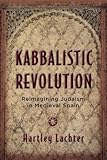Kabbalistic Revolution : reimagining Judaism in Medieval Spain.
Material type: TextSeries: Publication details: New Brunwick, N.J : Rutgers University Press, (c)2014.Description: 1 online resourceContent type:
TextSeries: Publication details: New Brunwick, N.J : Rutgers University Press, (c)2014.Description: 1 online resourceContent type: - text
- computer
- online resource
- 9780813568768
- BM354 .K333 2014
- COPYRIGHT NOT covered - Click this link to request copyright permission: https://lib.ciu.edu/copyright-request-form
| Item type | Current library | Collection | Call number | URL | Status | Date due | Barcode | |
|---|---|---|---|---|---|---|---|---|
 Online Book (LOGIN USING YOUR MY CIU LOGIN AND PASSWORD)
Online Book (LOGIN USING YOUR MY CIU LOGIN AND PASSWORD)
|
G. Allen Fleece Library ONLINE | Non-fiction | BM354 (Browse shelf(Opens below)) | Link to resource | Available | ocn894510269 |
Includes bibliographies and index.
Medieval Kabbalah was successful because it advanced a powerful way of imagining the meaning and relevance of Judaism in light of the declining political status of Jews in Western Europe and the proliferation of Christian anti-Jewish thought. The kabbalists claimed to reveal a secret doctrine, hidden among the sages of Israel, in which Jews are placed at the center of the cosmic-divine drama, maintaining the harmony of the secret inner life of God and sustaining the universe through the practice of Jewish law. According to the members of this movement, Jewish ritual is the powerful mechanism through which Jews bring harmony to the hidden facets of the divine world. In an environment in which Christian preachers claimed that Jews had been abandoned by God because they were blind to the true meaning of scripture, the kabbalists presented a radically different narrative, one that depicts Jewish religious life at the center of the universe. Medieval Kabbalah, when understood within its historical context, reveals itself to be a powerful gesture of cultural resistance that permanently transformed Judaism --
COPYRIGHT NOT covered - Click this link to request copyright permission:
There are no comments on this title.
